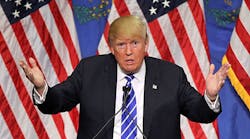President Donald Trump won’t immediately terminate U.S. participation in the North American Free Trade Agreement, the White House said, after he spoke with the leaders of Mexico and Canada about ways to renegotiate the accord.
“Both conversations were pleasant and productive. President Trump agreed not to terminate Nafta at this time and the leaders agreed to proceed swiftly, according to their required internal procedures, to enable the renegotiation of the Nafta deal to the benefit of all three countries,” the White House said in a statement late Wednesday. Mexico’s peso and Canada’s dollar jumped after the White House’s announcement.
Trump on the campaign trail last year made a hawkish vow to pull out of Nafta -- which he repeatedly called the “worst trade deal ever” -- if the U.S. didn’t get a better deal through immediate renegotiation. His decision Wednesday marks a continuing softening of his rhetoric on trade, after he recently said he would not declare China a currency manipulator, another campaign promise.
Trump said on Twitter on Thursday morning that he received calls from the leaders of Mexico and Canada, Enrique Pena Nieto and Justin Trudeau, “asking to renegotiate NAFTA rather than terminate.” Trump said he agreed, “subject to the fact that if we do not reach a fair deal for all, we will then terminate NAFTA. Relationships are good-deal very possible!”
Advisers’ Debate
Trump’s top advisers had been embroiled in a debate over how aggressively to proceed on reshaping U.S. participation in Nafta, with hard-liners favoring a threatened withdrawal as soon as this week and others advocating for a more measured approach to reopening negotiations with Canada and Mexico.
Some of Trump’s advisers wanted a dramatic move before Trump’s 100th day in office on Saturday to fulfill a key campaign promise, while others said he could let the milestone pass and revisit the issue later through more formal procedures, according to two White House officials who spoke on condition of anonymity to discuss internal deliberations.
The dispute played out in the media Wednesday, with several outlets saying Trump would take the most dramatic available option-- issuing an order declaring his intention to withdraw from the treaty. In this case, threatening to withdraw would have amounted to a formal step that started the process of giving Mexico and Canada six months notice that Trump intended to start negotiating.
Exactly who in the White House sparred over the decision wasn’t known, but one of the most prominent anti-trade hard-liners is senior counselor to the president Steve Bannon, and Trump’s decision is sure to be viewed as a defeat for Bannon and his views. Bannon already is seen as being on the outs with Trump over reportedly sparring with Trump’s son-in-law Jared Kushner.
New Talks
Instead of announcing his intent to withdraw from the agreement, Trump is asking the two other nations to open talks on ways to make the deal more balanced from the U.S. perspective, which is allowed within the framework of the treaty. His conversations with Pena Nieto and Trudeau took place late Wednesday afternoon, according to the White House.
“It is my privilege to bring Nafta up to date through renegotiation,” Trump said in the White House statement. “I believe that the end result will make all three countries stronger and better.”
Commerce Secretary Wilbur Ross told CNBC on Thursday that Mexico and Canada appear to be ready to start renegotiations of the trade pact. One of the issues he said the U.S. wants to target is the rules regarding country of origin of products sold under the deal. He said that Mexico’s trade deficit with China is approximately equal with their trade surplus with the U.S., indicating that products made in China are being sold under Nafta.
“The whole idea of a trade deal is to build a fence around participants inside and give them an advantage over the outside,” Ross said. “So there is a conceptual flaw in that -- one of the many conceptual flaws in Nafta.”
‘Bring Pressure’
Talk that Trump would revisit Nafta on Wednesday had caused Mexico’s peso, the Canadian dollar and shares of companies that rely on cross-border trade to plunge.
“Even if he notifies Mexico and the U.S. of his intentions, that doesn’t mean he has to leave,” said Beatriz Leycegui, who was Mexico’s deputy minister on foreign trade between 2006 and 2011. “This is a strategy to bring pressure on Canada and Mexico.”
Trump must give Congress 90 days notice that he seeks to renegotiate the accord. Ross said on Tuesday that the administration is busy working with lawmakers to kick start renegotiation of the deal, and that the U.S. was embarking on a more muscular strategy for trade-enforcement.
Trump has blamed Nafta for hollowing out America’s manufacturing sector by relocating jobs to lower-cost Mexico -- which his administration initially said was the main target of changes he was seeking to the accord.
‘Disastrously Bad’
Where Trump stands on Nafta has been hard to discern. After harsh rhetoric during the campaign, he has in recent weeks toned down his criticism, suggesting the relationship with Canada only needs tweaking. This week, he fueled trade tensions by imposing new duties on softwood lumber imports from Canada and vowing to defend U.S. dairy farmers against quotas imposed in Canada.
A number of Republicans are strong backers of free trade and have cautioned the administration against walking away from the free-trade deal.
“Scrapping Nafta would be a disastrously bad idea,” Republican Senator Ben Sasse of Nebraska, who was a Trump critic during the campaign, said Wednesday in a statement. “It would hurt American families at the check-out, and it would cripple American producers in the field and the office.”
Republican Senator Jeff Flake of Arizona also blasted the idea on Twitter, writing, “Increasing trade barriers with CAN and MEX will result in lost jobs and higher consumer costs in #AZ. Strengthen #NAFTA, don’t abandon it.”
Without Nafta -- which reduced or eliminated tariffs on most trade products after taking force in 1994 -- commerce ties between the nations would need to be reset, raising the specter of more frequent trade disputes and higher tariffs.
U.S. trade with its Nafta partners has more than tripled since the agreement took effect, rising to $1.1 trillion last year. Canada followed by Mexico ranked as the two biggest markets for U.S. exports, taking in a combined 34 percent of the total in 2016, according to a February paper published by the Congressional Research Service.










